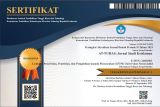Aceh, W. (2020). Di Kejati, Majelis Pengkajian Tauhid Tasawuf Bertemu Forkopimda Aceh. Waspadaaceh.Com. https://waspadaaceh.com/di-kejati-majelis-pengkajian-tauhid-tasawuf-bertemu-forkopimda-aceh/
Akbar, A. (2016). Looking at Ibn ‘Arabi’s Notion of Wahdat al-Wujud as a Basis for Plural Path to God. Journal of Islamic Studies and Culture, 4(1). https://doi.org/10.15640/jisc.v4n1a6
Alasmari, M. A. M. (2023). The reason for disagreement about the essence of the evidence: A study in Islamic jurisprudence. Journal of Law and Sustainable Development, 11(11), e2110. https://doi.org/10.55908/sdgs.v11i11.2110
Ali, Y. (1997). Manusia Citra Ilahi Pengembangan Konsep Insan Kamil Ibnu Arabi dan al-Jili. Paramadina.
Asred. (2020). Dinilai Ajaran Sesat, Ratusan Warga Tolak MPTT. Wartakini.Co. https://www.wartakini.co/2020/09/dinilai-ajaran-sesat-ratusan-warga-tolak-mptt/
Chittick, W. C. (1989). The Sufi path of knowledge: Ibn al-ʻArabi’s metaphysics of imagination. State University of New York Press.
Cibro, R. (2021a). Epistemologi Tasawuf; Dari Context Of Discovery Ke Context Of Justification. Bidayah: Studi Ilmu-Ilmu Keislaman, 20. https://doi.org/10.47498/bidayah.v12i1.474
Cibro, R. (2021b). Epistemologi Tasawuf Hamzah Fansuri dalam Kitab Sharb Al-Ashîqîn. At-Tafkir, 14(2), 134–149. https://doi.org/10.32505/at.v14i2.1936
Demichelis, M. (2020). The Khatim an-Nabiyyin (The Seal of the Prophets) and Its Inclusive Abrahamic Perspective: Muhammad and ‘Isa ibn Maryam in Dialogue. Religions, 12(1), 4. https://doi.org/10.3390/rel12010004
Dewey, J. (1908). What Does Pragmatism Mean by Practical? The Journal of Philosophy, Psychology and Scientific Methods, 5(4), 85. https://doi.org/10.2307/2011894
Dewey, J. (1916). The Pragmatism of Peirce. The Journal of Philosophy, Psychology and Scientific Methods, 13(26), 709. https://doi.org/10.2307/2012320
Fisher, R. P., Brewer, N., & Mitchell, G. (2009). The Relation between Consistency and Accuracy of Eyewitness Testimony: Legal versus Cognitive Explanations. In R. Bull, T. Valentine, & T. Williamson (Eds.), Handbook of Psychology of Investigative Interviewing (1st ed., pp. 121–136). Wiley. https://doi.org/10.1002/9780470747599.ch8
Ghany, A. A. A. (2020). Surat Pernyataan Tentang Kemursyidan Abuya Syekh H. Amran Waly Al-Khalidy.
Ichwan, Moh. N., Ulama’i, A. H. A., Masuwd, M. A., & Abdulghani, N. A. (2024). Sufism And Quranic Interpretation: Bridging Spirituality, Culture, and Political Discourse in Muslim Societies. Ulumuna, 28(2), 655–689. https://doi.org/10.20414/ujis.v28i2.1082
Imam, M. A., Ahmad, S., Bhatti, M. A. A., & Afzal, M. (2023). Contextualizing Research Approaches: The Role of Western and Islamic Philosophies in Shaping Methodology and Knowledge Creation. Al-Irfan, 8(16), 69–90. https://doi.org/10.58932/MULB0029
Islam, D. B. (2000). Surat Nomor 403/Dt.III.III/HM.01/08/2020 Tanggal 1 September 2020 Tentang Tanggapan Atas Literatur Tasawuf.
Ismarzuqoh, , Mahfudin Setiawan, A., & Budianto, A. (2024). The Naqsabandiyah Khalidiyah Order: Syaikh Imam Manaqib’s Role in Sufi Preaching in Adiluwih, Pringsewu 1960-1988. KnE Social Sciences. https://doi.org/10.18502/kss.v9i12.15859
LPBKI-MUI. (2020). Surat Nomor 306/LPBKI-MUI/IX/2020 Tanggal 20 September 2020 Tentang Hasil Pengkajian Literatur Tasawuf.
Lubis, A. A. F. (2023). MUI Sumut Larang MPTTI Gelar Muzakarah gegara Sebut “Muhammad Itu Allah.” Detik.Com. https://www.detik.com/sumut/a/d-6634745/mui-sumut-larang-mptti-gelar-muzakarah-gegara-sebut-muhammad-itu-allah
Mahmoud, M. E.-T. (2016). Comparative Research on the Zahir and Batin Thought. European Scientific Journal, ESJ, 12(17), 62. https://doi.org/10.19044/esj.2016.v12n17p62
Manan, A. (2021). The Role Of Tauhid Tasawuf Study Council In Preaching The Tawhîd And Tashawwuf In Aceh, Indonesia. Journal of Contemporary Islam and Muslim Societies, 5(1), 104–133. https://doi.org/DOI: 10.30821/jcims.v5i1.8708
Misri A Muchsin, Abdul Hadi, Abdul Manan, R. S. P. (2021). The Disputes of Ratéb Siribèe in Aceh. Miqot Jurnal Ilmu-Ilmu Keislaman, 45(1). http://dx.doi.org/10.30821/miqot.v45i1.798
MPU Aceh. (2009). Fatwa Nomor 6 Tahun 2009 Tentang Pemahaman Bi’dah dan Syubhat.
MPU Aceh. (2013). Keputusan MPU Aceh Nomor 10 Tahun 2013 Tentang Hasil Rapat Koordinasi II Majelis Ulama Aceh.
MPU Aceh. (2017a). Fatwa Nomor 4 Tahun 2017 Tentang Kitab-kitab yang Muktabarah di Aceh.
MPU Aceh. (2017b). Keputusan Rapat Koordinasi MPU Aceh Nomor 11 Tahun 2017 Tentang Upaya Pencegahan Aliran Sesat.
MPU Aceh. (2020). Tausiyah MPU Aceh Nomor 7 Tahun 2020 Tentang Majelis Pengkajian Tauhid Tasawuf Indonesia (MPTT-I).
Muchsin, M. A. (2019). Public Responses Toward the Sufi Tenet of Syekh Amran Waly and al-Jilli Sufism; A Study of Public Responses Within Northern and Eastern Area of Aceh Toward MPTT and Rateb Siribee (1st ed.). LPPM UIN Ar Raniry.
Muhtar, M. Z. (2024). Rabithah as an Instrument for Attaining Khushu in Salat: The Perspective of KH. Muhammad Utsman Al-Ishaqi. Journal of Pesantren and Diniyah Studies, 1(1), 81–91. https://doi.org/10.63245/jpds.v1i1.11
Nasr, S. H. (1989). Knowledge and the Sacret. State University of New York Press.
Rubaidi. (2021). Dari Tasawuf Amali, Akhlaqi hingga Falsafi: Potret Pembentukan Akhlaq pada Abuya Amran Waly al-Khalidi.
Rubaidi, S., & Handoyo, B. (2023). Menghidupkan Kembali Khazanah Klasik Tasawuf Aceh. Surabaya: IMTIYAZ.
Saif, L. (2024). The past and future of the study of Islamic esotericism. Religion Compass, 18(7), e12494. https://doi.org/10.1111/rec3.12494
Schimmel, A. (1975). Mystical Dimension of Islam. University of North Carolina Press.
Sehat Ihsan Shadiqin. (2021). Bertahan dalam Perubahan: Modifikasi dan Afiliasi Politik Tarekat Naqsyabandiyah Khalidiyah di Aceh. Jurnal Sosiologi Agama, 15(1), 53–70. https://doi.org/10.14421/jsa.2021.151-04
Siraj, S. (2021). Allah dan Alam Semesta Perspektif Tasawuf Falsafi (I. Mas’ udi & MIS Yahya. Yasasan Said Aqil Siraj.
Toohey, J. J. (1939). Reality and Truth. The Philosophical Review, 48(5), 492. https://doi.org/10.2307/2180450
Waly, A. A. (2017). Syarahan Qul Huwa Allahu Ahad dan Sekelumit Penyampaian Syekh Abdul Karim Al Jilli. MPTT-I.
Waly, S. A. (2021a). , Panduan Tawajjuh dan Pelajaran Suluk Tarekat Naqsyabandiyah Khalidiyah. MPTT-I.
Waly, S. A. (2021b). Ajaran Tasawuf dan Kesufian. MPTT-I.
Wirianto, D., Manan, A., Zubaidah, Z., & Suraiya, S. (2023). Unveiling Spiritual Guidance: Sheikh Muhammad Waly al-Khalidy’s Role in Naqshbandiyah Sufi Order in Aceh. Teosofi: Jurnal Tasawuf Dan Pemikiran Islam, 13(2), 181–203. https://doi.org/10.15642/teosofi.2023.13.2.181-203


 (STAIN Teungku Dirundeng Meulaboh)
(STAIN Teungku Dirundeng Meulaboh) 




.png)







